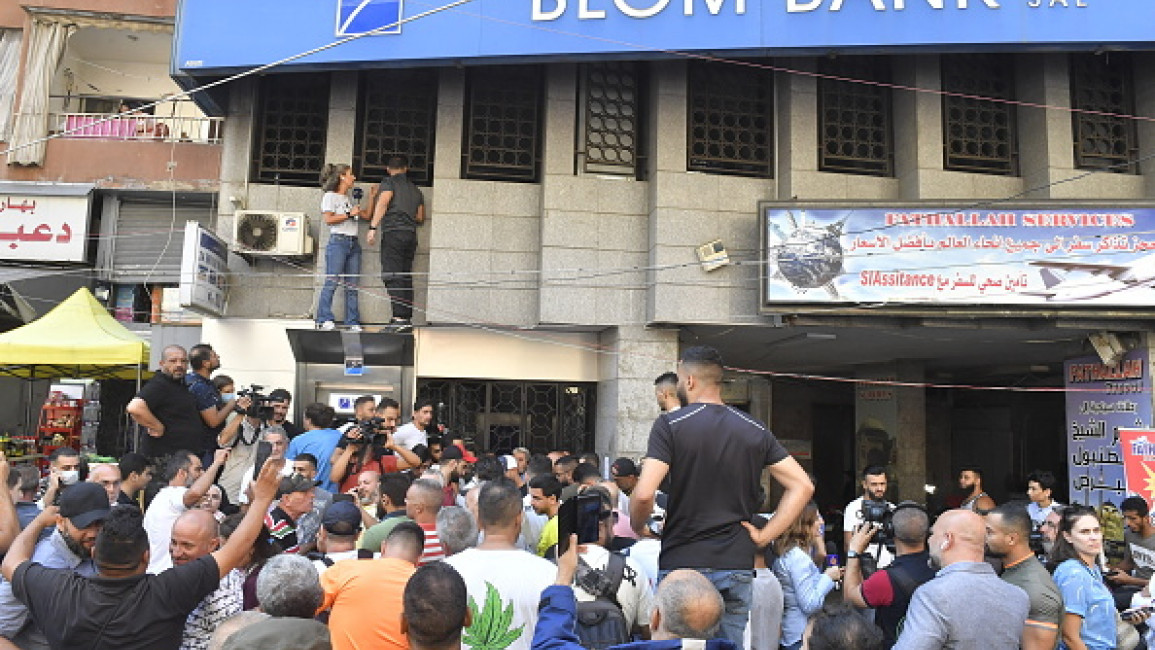Depositors revolt: Lebanon sees nationwide bank raids as people demand their money back
A spate of bank hold-ups rocked Lebanon on Friday as several banks were stormed by depositors demanding access to their savings.
The heists, some of them armed, have prompted banks to announce a three-day closure next week as up to nine branches were held up across Lebanon on Friday.
Earlier in the week, two more banks were targeted by customers demanding access to their money, one a woman needing funds for her sister's cancer treatment. They were partly successful.
It comes amid Lebanon's worst ever financial and economic crisis, which has seen banks freeze the savings of millions due to dwindling US dollar reserves despite no government order on capital controls.
There was a nearly day-long standoff in early August by a man who raided a Beirut bank with a pump action shotgun demanding his money back.
Many say they desperately need the money for medical care, as the case on Tuesday demonstrated.
In-depth: Hoping to unlock an IMF recovery package, Lebanon's controversial capital controls draft law has sparked widespread protests for protecting banks at the expense of depositors and pushing people further into poverty
— The New Arab (@The_NewArab) September 14, 2022
✍️ @DarioSabaghi https://t.co/G2xqN7jH14
"We have declared war on the banks, and nothing will stop us until we retrieve our rights," a group known as the Depositors' Outcry told local media.
"We are present on the ground and are supporting all those storming the banks," they added.
It is not clear if all the heists are coordinated or if they are individual acts.
The string of raids began Friday morning when an armed man stormed a Byblos Bank branch in the southern town of Ghazieh. He reportedly managed to walk out with thousands of US dollars, gave them to a relative, and later handed himself over to police.
Hours later another man stormed a BLOM Bank branch in Beirut’s Tariq al-Jdideh neighbourhood. Dozens gathered the bank in solidarity with the suspect.
الوضع في طريق الجديدة متوتر وتوافد عدة مودعين الى البنك ووصول الجيش ! pic.twitter.com/6XhDi9I4pz
— علاء (@alaa86ala) September 16, 2022
He reportedly refused to accept $40,000 in local currency at a rate of 12,000 LL, demanding all his savings in US dollars.
Raids continued in four banks in the capital’s Hamra, Verdun Street and Ramlet el-Baida, as well as two banks in Chiyah and Mreijeh, both in Beirut’s southern suburbs.
Local MTV reported that the Lebanon and Gulf Bank branch in Ramlet el-Baida only had $10,000 in cash, while the depositor - armed with a hunting rifle - was demanding $50,000.
The depositor who stormed the Banque Libano-Francaise branch in Mreijeh said he walked out with all his savings of $20,000 in only five minutes, armed with a toy gun.
News of more heists continued, as there were unconfirmed reports of an armed man raiding a bank in south Lebanon’s Nabatiyeh.
A first lieutenant in the army also reportedly stormed a bank in the Mount Lebanon town of Chhim. Gunshots were heard in this incident, according to Reuters.
The military and police forces have seen hundreds quit their jobs or run away as they struggle to make ends meet.
It is not clear if all depositors managed to get access to their money. Some also said they would surrender to police.
More heists are expected in the coming days as activists promised they will not hold back.
While some social media users expressed concern the incidents could set a dangerous precedent and lead the country to further chaos, others hailed and showed full support.
"Today I am not with any political party, nor do I want to support any politician in the country, today I stand with my rights and the peoples’ rights who have had enough. Playtime is over, now it’s serious business," wrote one Twitter user.
اليوم انا ما بقا بدي كون مع أي حزب من الأحزاب ولا بدي شيد باي سياسي بالبلد اليوم بدي حقي وحق الناس اللي كفرت وجاعت
— Nancy Lakiss🇱🇧 نانسي اللقيس 🇱🇧 (@lakiss_nancy) September 16, 2022
خلص انتهى الدلع وبلش الجد وعلينا وعلى أعداءنا #يسقط_حكم_المصرف
"You are the most honourable people," another wrote in reference to those raiding the banks.
يا مقتحمي المصارف انتم اشرف الناس ✌️✌️
— Wael (@wael333444) September 16, 2022
"Bank owners and their administrations are putting society in danger because of their insistence on holding up people's deposits."
أصحاب المصارف وإداراتها يعرّضون أمن المجتمع للخطر عبر اصرارهم على احتجاز ودائع الناس.
— Jad Lezeik (@JadLB) September 16, 2022
Typical of the Lebanese during times of crisis, others found the opportunity to make jokes and memes.
Me and the boys on our way to withdraw money from a Lebanese Bank pic.twitter.com/pRU4z9Pcp3
— Dαvid-Анмαd (@DavidAhmadMoh) September 16, 2022
"I really feel like going to a bank, but the problem is I owe them money," one man wrote.
والله عندي النية فوت على شي بنك بس المشكلة البنوك بدن مني مصاري😂
— Michel Chamoun (@Michelshamoun) September 16, 2022
The Association of Banks announced that all banks will be closed Monday, Tuesday and Wednesday next week. Experts warned that this would further negatively affect the monetary situation.
On Thursday, the Lebanese pound was trading at an all-time low against the US dollar, reaching about 38,000 LL after it fluctuated for weeks between 33,000 and 35,000 LL.
Interior Minister Bassam al-Mawlawi called for an emergency Security Council meeting at 2pm local time (11am GMT) to discuss the developments.
Lebanon’s cash-strapped banks have imposed strict limits on withdrawals of foreign currency since 2019, tying up the savings of millions of residents and expatriates, as well as foreign depositors.
The financial and economic collapse is blamed on decades of rampant corruption and poor management, with the absence of any real economic plan and long-term strategies to fix the country’s ailing power sector.
Billions have gone on subsidising essentials such as fuel, bread and medication.



